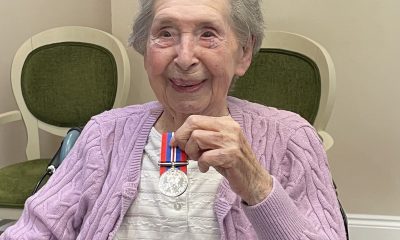By Mark Waghorn via SWNS
Older people's brains slow up because they have stored so much information, according to new research.
They have more space due to their accumulated knowledge but have more material to navigate.
Accessing memories becomes more difficult but also has its advantages as life experiences boost creativity and decision making, say scientists.
A review of behavioral and neuroimaging studies found the elderly have difficulty suppressing information that is no longer relevant.
When searching for a specific memory, they often retrieve other ones that are no longer useful.
via GIPHY
First author Dr. Tarek Amer, of Columbia University, New York, said: "Evidence suggests that older adults show preserved, and at times enhanced, creativity as a function of enriched memories.
"Older adults may be well served by their prior knowledge when it comes to decision-making, where they can pull on their accumulated wisdom."
The analysis also showed when given a cognitive task, older adults rely more heavily on previous knowledge than younger peers.
via GIPHY
But despite the difficulties these cluttered memories may pose, there are situations in which crowded memoryscapes are useful.
When a person tries to access a memory, their brain quickly sifts through everything stored in it to find the relevant information.
But as we age, many of us have difficulty retrieving memories.
The study in the journal Trends in Cognitive Sciences suggests the brains of older adults allocate more space to accumulated knowledge.
What is more, they have more material to navigate when attempting to access memories.
With continued study and increased understanding, the US and Canadian teams are hopeful that they may be able to find new ways to help them.
Dr. Amer said: "Healthy aging is accompanied by declines in control of attention.
"These reductions result in processing too much information, creating cluttered memory representations.
"These can impair memory by interfering with the retrieval of target information.
"But they can also provide an advantage on tasks that benefit from extensive knowledge."
It sheds fresh light on why older people are often more forgetful.
Dr. Amer said: "It is possible the increased binding and richer encodings of older adults can even be leveraged to improve older adults' learning and memory."
Wisdom and knowledge, cognitive functions that depend on being able to access and use memory, grow into old age.
Yet research shows intentional, episodic memory declines - a paradox that has baffled neuroscientists for decades.
Dr. Amer said: "We propose that, relative to younger adults, healthy older adults typically between 60 and 85 process and store too much information."
It is the result of reductions in cognitive control or inhibitory mechanisms.
When efficient, these mechanisms enable a focus on target or goal-relevant information to the exclusion of irrelevant information.
Dr. Amer said: "Older adults have greater knowledge of the world but generally show poorer episodic memory performance on many laboratory-based tasks relative to young adults.
"Here, we propose that this paradox can be accounted for, at least partially, by the uniquely cluttered/enriched memory representations of older adults.
"Specifically, unlike young adults, older adults' memory representations contain target information bound to irrelevant or knowledge-based details, likely formed as a function of reduced cognitive control."
With these cluttered representations, they are more likely to activate excessive information.
Dr. Amer added: "The current environment might well play a substantial role in the mental lives of older adults and might even help to offset some clutter-related retrieval difficulties, but, in our view, it is the ability to control excessive information that is the more powerful source of age differences in memory."


 Parenting1 week ago
Parenting1 week ago
 Lifestyle1 week ago
Lifestyle1 week ago
 Wildlife3 days ago
Wildlife3 days ago
 Good News4 days ago
Good News4 days ago
 Health4 days ago
Health4 days ago
 Entertainment1 day ago
Entertainment1 day ago
 Broadcast7 hours ago
Broadcast7 hours ago
 Work2 days ago
Work2 days ago





















